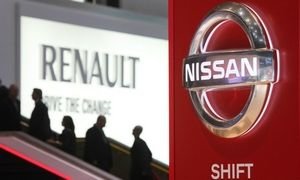Renault-Nissan goes for closer cooperation, outsells VW and Toyota

Chairman Carlos Ghosn has pledged to step up the pace of integration after Nissan took a controlling stake in Mitsubishi last year. The 18-year-old Renault-Nissan pairing has only recently begun rolling out cars on common architectures.
Combined sales volumes are expected to rise to 14 million vehicles by 2022 from 10.5 million expected this year, with revenue advancing by a third to $240 billion, the alliance said at a news conference in Paris on Friday.
However, any investors impatient for a new capital or management structure to speed integration and prepare Ghosn's succession were likely to be disappointed.
There was "no answer from Ghosn on the possibility of a merger by 2022," Jeffries analyst Philippe Houchois noted.
12 NEW ALL-ELECTRICS
Ghosn has been seeking a new second-in-command, sources told Reuters in June. But such plans are linked to thornier questions about the balance of power between the two main carmakers and the French government's outsize clout as Renault's biggest shareholder, supported by double voting rights.
Twelve new pure-electric models will be on the road by 2022 as Renault-Nissan seeks to defend the head-start it gained with the current generation of battery cars, spearheaded by the Nissan Leaf and Renault Zoe, as more competitors join the fray.
With 5.27 million cars and vans delivered in the first half of the year, Renault-Nissan now claims the mantle of the world's biggest carmaker, ahead of Volkswagen and Toyota, even though Renault has never consolidated the sales of its 43.4 percent-owned Japanese affiliate into its own.
Under existing plans, the alliance is seeking to increase synergies — from cutting costs and boosting revenue — to 5.5 billion euros next year from 5 billion recorded in 2016.
SHARED PLATFORMS
A fourth common vehicle platform will be shared across the alliance by 2022, the companies said on Friday, underpinning a future generation of electric cars which, together with hybrids, are expected to account for 30 percent of group sales.
Renault-Nissan will aim to deliver more electric vehicles and also make greater use of shared technology and manufacturing processes.
"Without a doubt, what we have seen and acted on and executed eight years ago is becoming mainstream," Ghosn told reporters at a presentation in Paris.
Renault will soon launch an electrified version of the Kwid mini-SUV in China, he added, confirming media reports.
As more models are launched on the new platforms by Renault, Nissan, Mitsubishi and their other brands, shared architectures will account for 70 percent of sales by 2022, with common engines installed in 75 percent.
Friday's announcement was thin on details of how closer convergence would be achieved. Relations between Renault and Nissan engineering teams have sometimes been fraught, hampering savings in areas such as engines and transmissions.
Convergence efforts will continue with no radical change to management structures, Ghosn said, suggesting that he had no immediate plans to hand over the reins.
Ghosn stepped aside as Nissan chief executive in April while remaining chairman; his current Renault CEO contract expires next year.
"I am intending to execute on the plan as long as it makes sense," he said.
More information on operational and product strategies and financial goals are expected when Renault, Nissan and Mitsubishi each announce their mid-term plans in coming weeks — starting with the French carmaker on Oct. 6.
